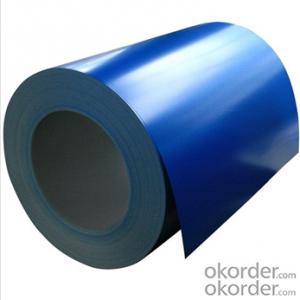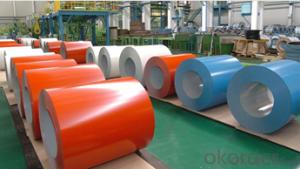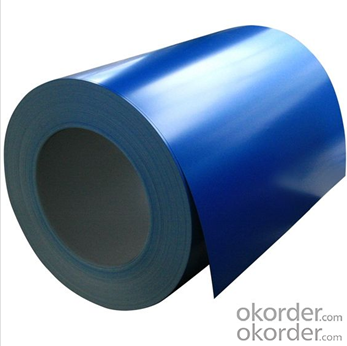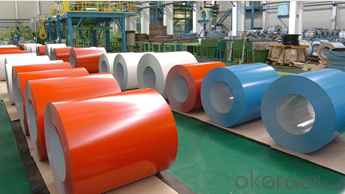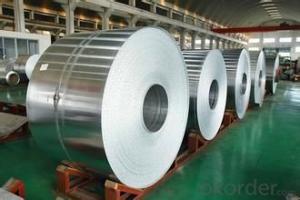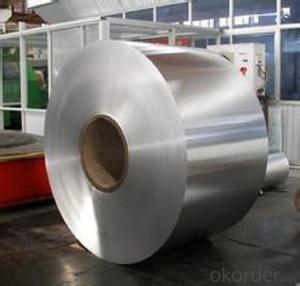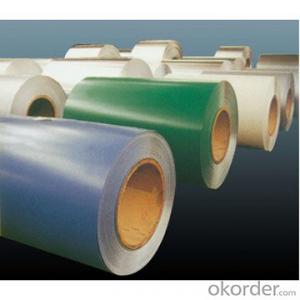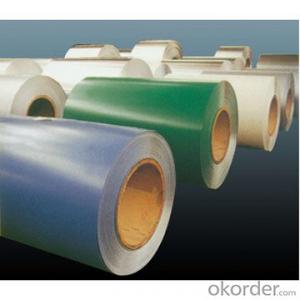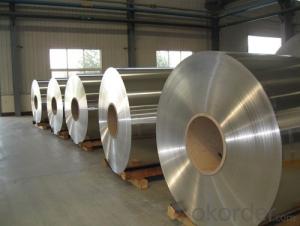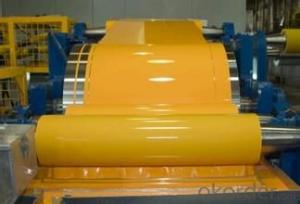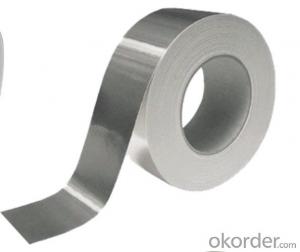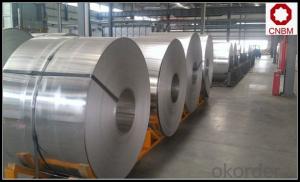1100 H14 Prepainted Color Coated Aluminum Coil
- Loading Port:
- Qingdao
- Payment Terms:
- TT OR LC
- Min Order Qty:
- 5 m.t.
- Supply Capability:
- 5000 m.t./month
OKorder Service Pledge
OKorder Financial Service
You Might Also Like
Specification
Structure of Prepainted Aluminum Coils 1XXX Description
Prepainted Aluminum Coils 1XXX are of a wide range of colors, which give wonderful appearance no matter in residential and commercial constructions or great exhibition centers.
Prepainted Aluminum Coils 1XXX have been widely used in the fields of construction and decoration, electronic applications, lighting decoration, air-condition air pipes, sandwich panels and drainages etc.
Description
Main Features of Prepainted Aluminum Coils 1XXX
• Superior quality of raw material
• Reasonable and stable chemical composition
• Accurate tolerance
• Goode mechanical property
Pictures
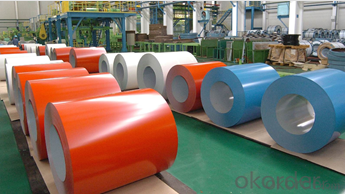
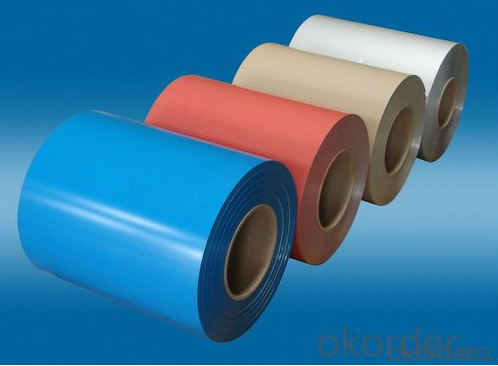
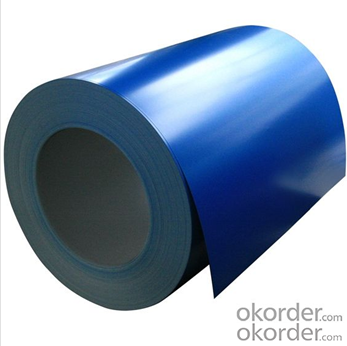
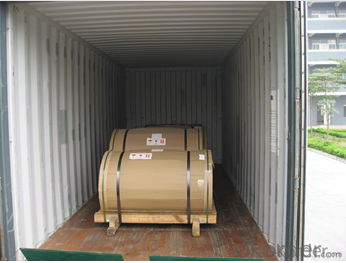
Product Description
Aluminium is remarkable for the metal's low density and for its ability to resist corrosion due to the phenomenon of passivation. Structural components made from aluminium and its alloys are vital to the aerospace industry and are important in other areas of transportation and structural materials. The most useful compounds of aluminium, at least on a weight basis, are the oxides and sulfates.
Despite its prevalence in the environment, no known form of life uses aluminium salts metabolically. In keeping with its pervasiveness, aluminium is well tolerated by plants and animals. Owing to their prevalence, potential beneficial (or otherwise) biological roles of aluminium compounds are of continuing interest.
The earliest citation given in the Oxford English Dictionary for any word used as a name for this element is alumium, which British chemist and inventor Humphry Davy employed in 1808 for the metal he was trying to isolate electrolytically from the mineral alumina. The citation is from the journal Philosophical Transactions of the Royal Society of London: "Had I been so fortunate as to have obtained more certain evidences on this subject, and to have procured the metallic substances I was in search of, I should have proposed for them the names of silicium, alumium, zirconium, and glucium."
FAQ
1. What is the applications?
Outdoor decoration, business chain, exhibition of advertisement decoration and display ,ACP, wall cladding, facades, roofs and canopies, ceilings, signboards, blind window, display platforms, electrical panels etc.
2. What is the popular size?
1000*2000,1200*2400,1219*2438,1220*2440
1000*3000,1250*3000,1500*3000 etc.
3. What is the coating?
Polyester, Fluorocarbon, polyurethane and epoxy coating
4. What is the Surface Quality?
be free from Oil Stain, Dent, Inclusion, Scratches, Stain, Oxide Dicoloration, Breaks,
Corrosion, Roll Marks, Dirt Streaks and other defect which will interfere with use
5. How about the shipment?
Shipment: By bulk vessel or By container
Welcome to inquiry us! Hope we can establish a long-term relations of cooperation.
- Q: How are aluminum coils tested for mechanical properties?
- Aluminum coils are typically tested for mechanical properties through various methods such as tensile testing, hardness testing, and bend testing. Tensile testing involves subjecting a sample of the coil to tension until it breaks, allowing for the measurement of its yield strength, ultimate tensile strength, and elongation. Hardness testing measures the coil's resistance to indentation or scratching, providing an indication of its strength and durability. Bend testing assesses the coil's ability to withstand deformation by bending it to a specific angle without cracking or breaking. These tests help evaluate the mechanical properties of aluminum coils, ensuring their suitability for specific applications.
- Q: How are aluminum coils used in the production of beverage cans?
- The production of beverage cans relies heavily on aluminum coils, which serve as a critical component. These coils, essentially flat and thin aluminum sheets, are wound into a coil shape. To begin with, the aluminum coils undergo unwinding and are fed into a machine that applies a thin layer of protective material, typically a polymer. This coating serves to prevent any interaction between the aluminum and the beverage, thereby preserving its taste and quality. Subsequently, the coated aluminum coils pass through a series of rollers that gradually shape them into a cylindrical form. This process, known as cupping, involves transforming the flat coil into a cup-like shape, which ultimately becomes the body of the beverage can. Once the cups are formed, they undergo trimming to achieve the correct height and diameter. To minimize waste, any excess aluminum is recycled. Following this, the cups are cleaned and rinsed thoroughly to eliminate any impurities. After the cleaning process, the cups are conveyed through another machine that applies a liquid compound to their inner surface. This compound acts as a barrier, preventing any potential reactions or contamination between the aluminum and the beverage. Following this step, the cups are shaped into the final can body by being pressed between a top and bottom mold. These molds are designed to give the cans their distinctive shape and ridges. Any excess aluminum is trimmed off, and the cans undergo another round of cleaning to ensure their purity. Finally, the cans are sent for filling with the desired beverage, sealing, and labeling. Once these processes are completed, the cans are packaged and dispatched for distribution. In conclusion, aluminum coils are an essential element in the production of beverage cans, providing the raw material from which the cans are made. Through a sequence of procedures encompassing coating, cupping, shaping, and cleaning, the aluminum coils are transformed into the final can bodies. These cans are then filled, sealed, labeled, and prepared for consumption.
- Q: I would like to know why the ionic substance aluminium oxide doesn't dissolve in water.
- Aluminium gives away 3 electrons, and two aluminium atoms are combined with 3 oxygen atoms, the charge is just to great for it to gracefully dissolve.
- Q: Are aluminum coils resistant to impact damage?
- Yes, aluminum coils are generally resistant to impact damage. Aluminum is a lightweight and durable material that can withstand minor impacts without getting damaged. However, excessive force or strong impacts may still cause damage to the coils.
- Q: Describe the steps involved in the production of aluminum coil.
- <p>The process of making aluminum coil involves several key steps. Initially, raw materials, typically bauxite ore, are mined and then refined to produce aluminum oxide. This aluminum oxide is then reduced to aluminum metal through the Hall-H茅roult process, where it is dissolved in molten cryolite and electrolyzed to extract aluminum. Once the aluminum is produced, it is melted and then continuously cast into large slabs or billets. These slabs are then hot or cold rolled to reduce their thickness and width, forming coils. The coils are annealed to improve their mechanical properties and surface finish. Finally, the aluminum coils are cleaned, inspected, and cut to size before being packaged and shipped to customers for various applications such as construction, automotive, and packaging.</p>
- Q: Can aluminum coils be used in automotive applications?
- Yes, aluminum coils can be used in automotive applications. Aluminum coils are lightweight, which makes them an excellent choice for automotive manufacturers as it helps to reduce the overall weight of the vehicle. This, in turn, can improve fuel efficiency and performance. Additionally, aluminum coils have excellent heat conductivity, which is crucial in automotive applications where heat dissipation is important. Moreover, aluminum coils have good corrosion resistance, which is particularly beneficial in automotive applications where vehicles are exposed to various weather conditions and road salts. Overall, the use of aluminum coils in automotive applications can provide several advantages such as weight reduction, improved fuel efficiency, better heat dissipation, and enhanced corrosion resistance.
- Q: Why does the end face of aluminum coil have grease spots?
- Process one without coolant to see whether there are spots. There is a layer of alumina membrane on the blank face of aluminum coil, which will react with basic coolant when heating through processing.
- Q: Can aluminum coils be used in the production of military equipment?
- Yes, aluminum coils can be used in the production of military equipment. Aluminum is a lightweight and corrosion-resistant material, making it suitable for various military applications, such as aircraft components, armored vehicles, and weapon systems. Its strength to weight ratio and ability to withstand harsh environments make it an ideal choice for military equipment manufacturing.
- Q: Can aluminum coils be used in marine applications?
- Yes, aluminum coils can be used in marine applications. Aluminum is a corrosion-resistant metal that provides excellent durability and strength, making it suitable for various marine environments. It is commonly used in boat building, marine equipment, and other marine applications due to its lightweight nature and resistance to saltwater corrosion.
- Q: Are aluminum coils suitable for food and beverage packaging?
- Yes, aluminum coils are suitable for food and beverage packaging. Aluminum is a versatile material that offers various advantages for packaging applications. It is lightweight, making it easy to transport and handle. Aluminum is also highly resistant to corrosion, which ensures that the packaging remains intact and protects the contents from external factors. Additionally, aluminum has excellent thermal conductivity, allowing for efficient heat transfer, which is beneficial for food and beverage products that require temperature control. It is also impermeable to light, moisture, and oxygen, providing an excellent barrier to maintain the quality and freshness of the packaged items. Furthermore, aluminum is recyclable and can be reused, making it an environmentally friendly choice for packaging. Overall, aluminum coils are a reliable and suitable option for food and beverage packaging due to their durability, protective properties, and sustainability.
Send your message to us
1100 H14 Prepainted Color Coated Aluminum Coil
- Loading Port:
- Qingdao
- Payment Terms:
- TT OR LC
- Min Order Qty:
- 5 m.t.
- Supply Capability:
- 5000 m.t./month
OKorder Service Pledge
OKorder Financial Service
Similar products
Hot products
Hot Searches
Related keywords
